Liturgical Calendar
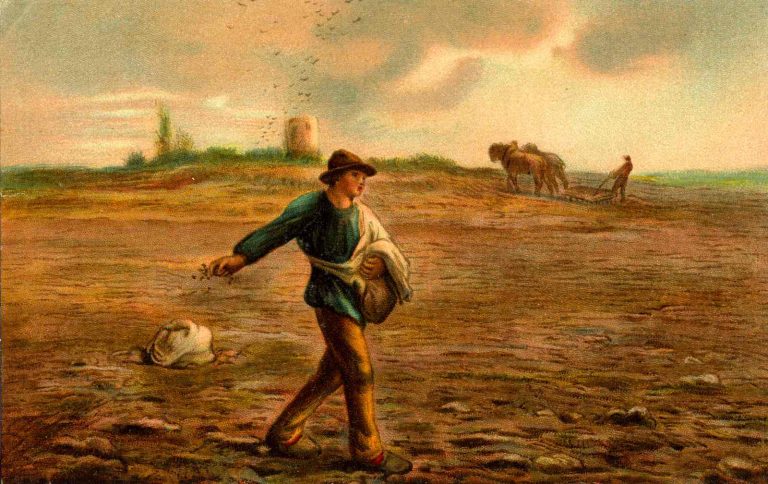
The Church offers to our consideration, during this week of Sexagesima, the history of Noah and the deluge. Man has not profited by the warnings already given him. God is obliged to punish him once more, and by a terrible chastisement. There is found out of the whole human race one just man God makes a covenant with him, and with us through him. But, before he draws up this new alliance, he would show that he is the Sovereign Master, and that man, and the earth whereon he lives, subsist solely by his power and permission.
This awful chastisement of the human race by the Deluge was a fresh consequence of sin. This time, however, there was found one just man; and it was through him and his family that the world was restored. Having once more mercifully renewed his covenant with his creatures, God allows the earth to be re-peopled, and makes the three sons of Noah become the Fathers of the three great families of the human race.
This is the Mystery of the Divine Office during the week of Sexagesima. The Mystery expressed in to-day’s Mass is of still greater importance, and the first is but a figure of the second. The earth is deluged by sin and heresy. But the Word of God, the Seed of life, is ever producing a new generation, a race of men, who, like Noah, fear God. It is the Word of God that produces those happy children, of whom the Beloved Disciple speaks, saying: they are born not of blood, nor of the will of the flesh, nor of the will of man, but of God [St. John, 1. 13]. Let us endeavor to be of this family; or, if we already be numbered among its members, let us zealously maintain our glorious position. What we have to do, during these days of Septuagesima, is to escape from the Deluge of worldliness, and take shelter in the Ark of salvation; we have to become that good soil, which yields a hundred-fold from the heavenly Seed. Let us flee from the wrath to come, lest we perish with the enemies of God: let us hunger after that Word of God, which converteth and giveth life to souls [Ps. xviii].
With the Greeks, this is the seventh day of their week Apocreös, which begins on the Monday after our Septuagesima Sunday. They call this week Apocreös, because they then begin to abstain from flesh-meat, which abstinence is observed till Easter Sunday.
Whilst the earth is being moved, and is suffering those terrible revolutions, which, deluge-like, come first on one nation and then on another, – the Church prays for her Faithful Children, in order that they may be spared, for they are the elect, and the hope of the world. It is thus she prays in the following Tract which precedes the Gospel of the Word.
St. Gregory the Great justly remarks, that this Parable needs no explanation. since Eternal Wisdom himself has told us its meaning. All that we have to do, is to profit by this divine teaching, and become the good soil, wherein the heavenly Seed may yield a rich harvest. How often have we not, hitherto, allowed it to be trampled on by them that passed by, or to be torn up by the birds of the air? How often has it not found our heart like a stone, that could give no moisture, or like a thorn plot, that could but choke? We listened to the Word of God; we took pleasure in hearing it; and from this we argued well for ourselves. Nay, we have often received this Word with joy and eagerness. Sometimes, even, it took root within us. But alas! something always came to stop its growth. Henceforth, it must both grow and yield fruit. The Seed given to us is of such quality, that the Divine Sower has a right to expect a hundred-fold. If the soil, that is, if our heart, be good; if we take the trouble to prepare it, by profiting of the means afforded us by the Church; we shall have an abundant harvest to show our Lord on that grand Day, when, rising triumphant from his Tomb, he shall come to share with his faithful people the glory of His Resurrection.
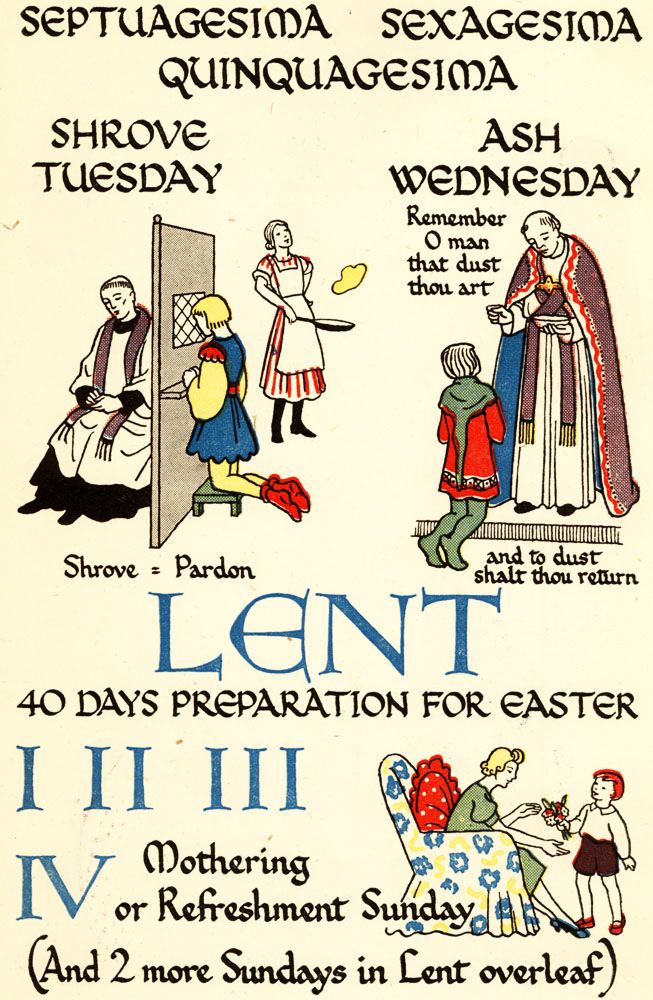
St. Paul tells us that this world is a race, wherein all must run; but that they alone win the prize, who run well. Let us, therefore, rid ourselves of all things that could impede us, and make us lose our crown. Let us not deceive ourselves: we are never sure, until we reach the goal. Is our conversion more solid than was St. Paul’s? Are our good works better done, or more meritorious, than were his? Yet he assures us that he was not without the fear that he might perhaps be lost; for which cause he chastised his body, and kept it in subjection to the spirit.
Man, in his present state, has not the same will for all that is right and just, which Adam had before he sinned, and which, notwithstanding, Adam abused to his own ruin. We have a bias which inclines us to evil; so that our only means of keeping our ground is to sacrifice the flesh to the spirit.
To many this is very harsh doctrine, hence, they are sure to fail; they never can win the prize. Like the Israelites spoken of by our apostle, they will be left behind to die in the desert, and so lose the promised land. Yet they saw the same miracles that Josue and Caleb saw!
So true is it that nothing can make a salutary impression on a heart which is obstinately bent on fixing all its happiness on the things of this present life; and though it is forced, each day, to own that they are vain, yet each day it returns to them, vainly but determinedly loving them.
Commentary from The Liturgical Year by Prosper Gueranger, O.S.B. (1805-1875)
“But the children of the kingdom shall be cast out into the exterior darkness; there shall be weeping and gnashing of teeth.” -Matthew 8:12.
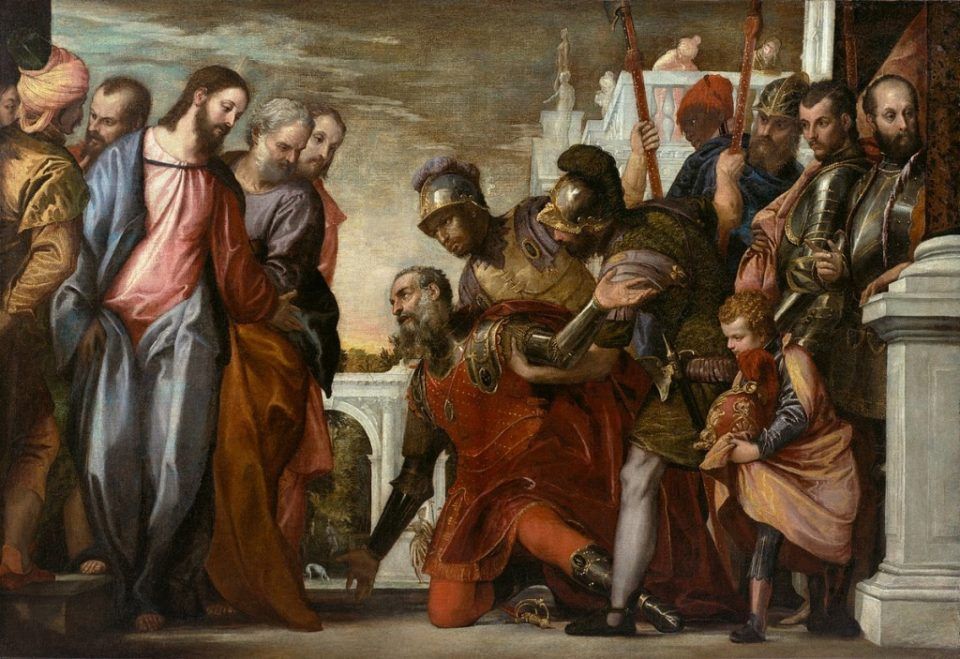
In the Gospel of this day it is related that, “when Jesus Christ entered into Capharnaum, there came to him a centurion beseeching him” to cure his servant, who lay sick of the palsy. Jesus answered: “I will come and heal him.” “No,” replied the centurion, “I am not worthy that thou shouldst enter under my roof; but only say the word, and my servant shall be healed.” (v. 8.) Seeing the centurion’s faith, the Redeemer instantly consoled him by restoring health to his servant; and, turning to his disciples, he said: “Many shall come from the east and the west, and shall sit down with Abraham and Isaac and Jacob in the kingdom of Heaven. But the children of the kingdom shall be cast out into the exterior darkness; there shall be weeping and gnashing of teeth.” By these words our Lord wished to signify that many persons born in infidelity shall be saved, and enjoy the society of the saints, and that many who are born in the bosom of the Church shall be cast into Hell, where the worm of conscience, by its gnawing, shall make them weep bitterly for all eternity.
Let us examine the remorses of conscience which a damned Christian shall suffer in Hell: the remorse arising from the thought of the little which he was required to do in order to save his soul; from the remembrance of the trifles for which he lost his soul; from the knowledge of the great good which he has lost through his own fault.… Each of the reprobate will say for eternity: If I abstained from such a gratification; if in certain circumstances I overcame human respect; if I avoided such an occasion of sin, such a companion, I should not now be damned; if I had frequented some pious sodality; if I had gone to confession every week; if in temptations I had recommended myself to God, I would not have relapsed into sin. I have so often proposed to do these things, but I have not done them. I began to practice these means of salvation, but afterwards gave them up; and thus, I am lost.
This torment will be increased by the remembrance of the good example given them by some young companions who led a chaste and pious life even in the midst of the world. It will be still more increased by the recollection of all the gifts which the Lord had bestowed upon them, that by their cooperation they might acquire eternal salvation; the gifts of nature — health, riches, respectability of family, talents; all gifts granted by God, not to be employed in the indulgence of pleasures and in the gratification of vanity, but in the sanctification of their souls, and in becoming saints.
Commentary by St. Alphonsus Maria de Liguori, C.Ss.R. (1696-1787)
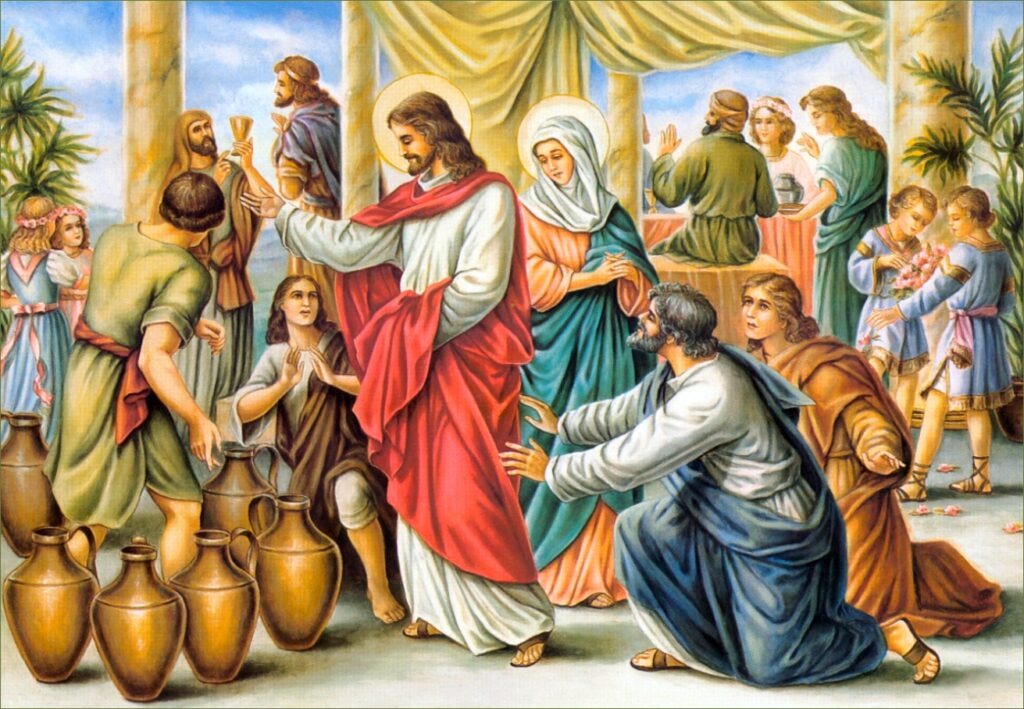
The wedding feast at Cana is significant because it was the first public miracle performed by Jesus, and it revealed His divine nature to His disciples. The Wedding at Cana is also considered a symbol of the union between Christ and the Church. The miracle of turning water into wine is not only a testament to Jesus’ divine power, but also a sign of God’s love for humanity and spousal love for the Church. The sacrament of marriage is a reflection of this love, and the wedding feast of Cana is a reminder of the sacredness of this union.
In the Gospel of John, the wedding feast of Cana is described as the place where Jesus performed His first miracle. The story tells us that Jesus and His mother Mary were guests at a wedding in Cana, and when the wine ran out, Mary asked Jesus to help. Jesus then instructed the servants to fill six stone jars with water, which He then turned into wine, revealing His divine nature. The wine was of such high quality that the master of the banquet was surprised that it had not been served earlier. In starting His public ministry at the wedding feast at Cana, in sharing His divinity at a wedding feast, Christ showed His love for the Church and the importance of the sacrament of marriage.
The wedding feast at Cana is a powerful reminder of the love that Christ has for His Church, and the importance of the sacrament of marriage. It is a beautiful symbol of the transformation that can occur when we invite Christ into our lives and allow Him to work His miracles in us.
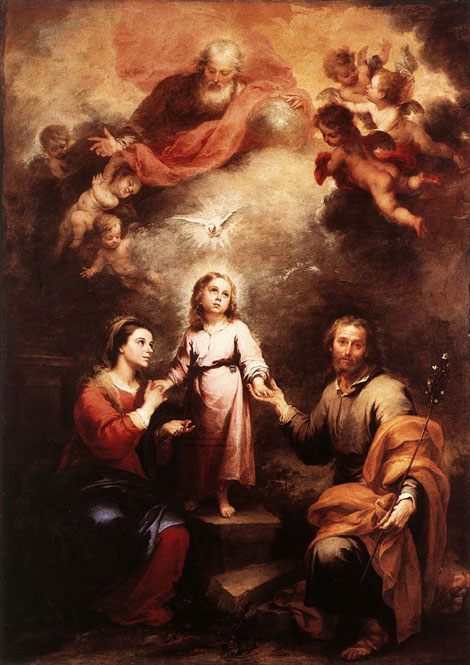
In the humble house of Nazareth, Jesus, Mary, and Joseph sanctified their family life by the exercise of the domestic virtues (Collect). There they practiced, as the Epistle and Gospel tell us, charity, mutual help, respect, and obedience (Gospel). There also, they always found joy and peace in meditation and prayer in common.
Benedict XV, wishing to secure for souls the blessings flowing from meditations on the virtues of the Holy Family, and from their imitation, extended the feast to the whole Church.
The Holy Family of Jesus, Mary, and Joseph is considered the “true model of life” from which families can draw inspiration and know where to find help and comfort. The Feast of the Holy Family venerates the familial life of Jesus, Mary, and Joseph and invites the faithful to reflect on the virtues, love, and sanctity embodied within the Holy Family, serving as a model for all families. At its core, the feast emphasizes the humanity of Jesus and his upbringing within a family unit. Mary, chosen as the Mother of God, and Joseph, a righteous and devoted foster father, provided a nurturing environment for Jesus’ growth, protection, and education. Their lives were marked by obedience to God’s will, humility, and unwavering faith.
The Holy Family’s experiences, including their flight into Egypt and their everyday life in Nazareth, offer insights into coping with challenges, trust in God’s guidance, and resilience in the face of adversity. The feast calls for contemplation on the importance of family in the Christian faith and the significance of the family unit as the foundation of society. It encourages a deepened commitment to fostering love, understanding, and support within families, thereby strengthening the broader community. Ultimately, the lessons learned from the Holy Family can guide and nurture contemporary families in their journey towards spiritual growth, unity, and holiness.
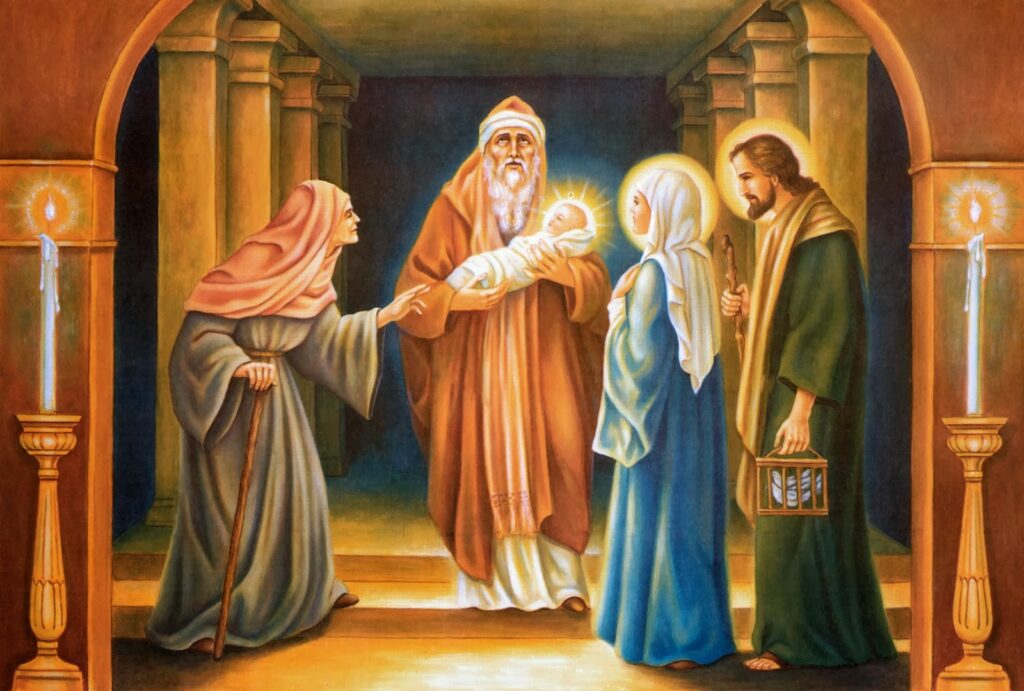
There is only one day within the Christmas Octave (i.e. the 30th of December) which is not a Saint’s Feast. During the Octaves of the Epiphany, Easter and Pentecost, the Church is so absorbed in the respective mysteries that she puts off everything that could share her attention; whereas during this of Christmas, there is only one day which does not celebrate the memory of some glorious Saint, and our Infant Jesus is surrounded by a choir of heroes who loved and served him. Thus, the Church, or, more correctly, God—for God is the first author of the cycle of the year—shows us how the Incarnate Word, who came to save mankind, desires to give mankind confidence by this his adorable familiarity.
We have already shown that the Birth of our Lord took place on a Sunday, the Day on which, in the beginning of the world, God created Light. We shall find, later on, that his Resurrection also was on a Sunday. This the first day of creation, and the first of the week, was consecrated by the old Pagans to the Sun; with us Christians, it is most sacred and holy, on account of the two risings of our divine Sun of Justice—His Birth and His Resurrection. Whilst the solemnity of Easter is always kept on a Sunday, that of Christmas falls by turns on each of the days of the week—we have already had this difference explained to us by the Holy Fathers: but the mystery of Jesus’ Birth is more aptly and strongly expressed, when its anniversary falls on a Sunday. Other years, when the coincidence does not happen, the Faithful will at least be led by their Christian instincts, to give special honor to the day within the Octave which falls on the Sunday. The Church has honored it with a proper Mass and Office. . . .
The passage of the Gospel selected for this Mass, though bearing on the Divine Infancy, yet gives us, we may almost say prematurely, the terrible prophecy of Simeon regarding the dear Babe of Bethlehem. The heart of Mary, that was overflowing with joy at the miraculous Birth of her Child, is here made to feel the sword spoken of by the venerable Priest of the temple. Her Son, then, is to be but a sign that shall be contradicted! The mystery of man’s adoption by God is to cost this Child of hers his life! We that are the Redeemed in His Blood, we may not yet dwell on the fatigues and the Passion and the Death of our Emmanuel: the time will come for that. At Present we are forbidden to think of him other than as the sweet Child that is born to us, the source of all our happiness by his having come among us.
Commentary from The Liturgical Year, Dom Prosper Guéranger (1805-1875)
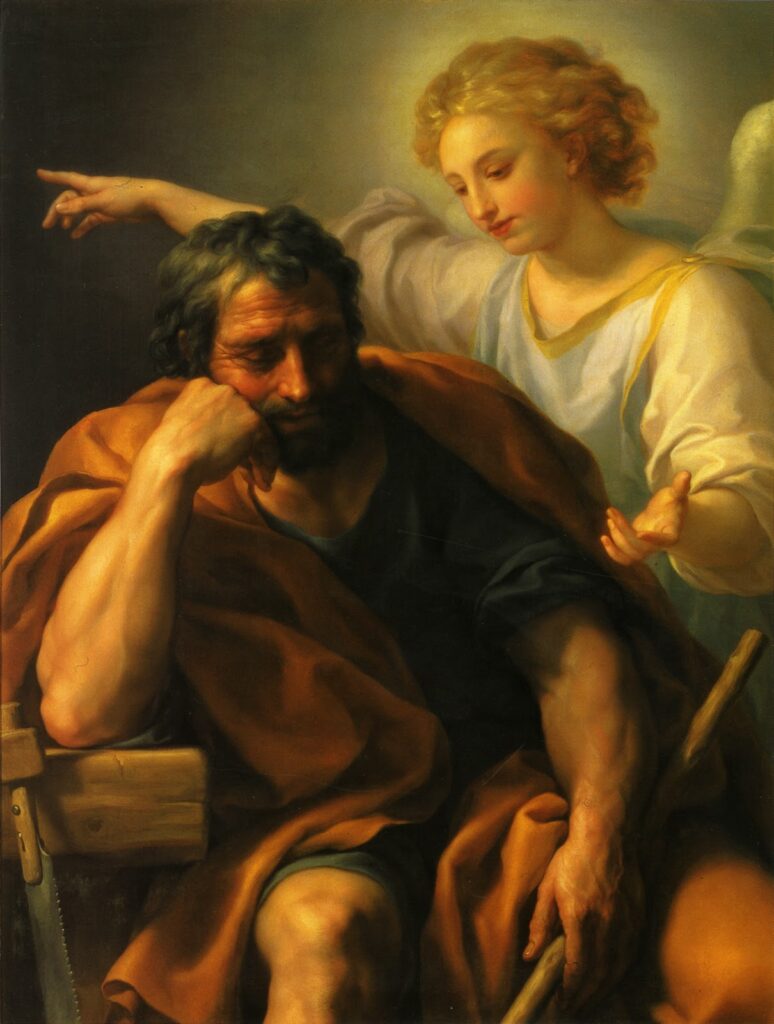
There is nothing unreal about the marriage of Mary and Joseph. Never, in fact, had earth seen a more perfect union, a love so deep, so glorious. For they loved each other in God.
The Holy Spirit hovered over their loving union, drawing them ever closer into the tender embrace of the Thrice Holy God. He was the foundation of their being. In adoring Him, their souls were joined. He was the seal of their oneness. It was this that made the strength and beauty of their marriage. In his Epistle to the Romans, St. Paul writes: “For I am sure that neither death, nor life, nor angels, nor principalities, nor things present, nor things to come, nor powers, nor height, nor depth, nor any other creature will be able to separate us from the love of God, which is in Christ Jesus our Lord.” That was the secret time-beat which every instant throbbed in the hearts of Mary and Joseph. As divine love is incorruptible, so their love springing from it was invincible, and indeed, far from distracting them from God, it helped to unite them closer to Him. It was so from the time of their first vows. Joseph then thought he could never love Mary more than at that moment, but after the angel’s revelation she became dearer still. The strength of his attachment made him a new man. The Infant-God that she carried increased his reverence, since he looked upon her as a new Ark of the Covenant and a Tabernacle of the Holy of Holies.
As for Mary, she saw in Joseph the representative of Divine Authority, the one chosen to be God’s coadjutor in the mystery of the Incarnation, and always she showed him deference, submission and tender affection. Their vows of virginity served but to unite them more closely. It was because their love had in it no fleshly desires that it was untroubled by anxiety, doubt, bitterness or disappointment. Virginal love is without spot or wrinkle. They knew nothing of what St. Paul calls “the tribulation of the flesh” (I Cor. 7:28). Holy in mind and body, their affection for each other was capable of constant enrichment and increase: “O holy virginity,” cried Bossuet, “your fires are stronger because they are free; the flames that burn in us can never equal the ardor of the chaste embrace of souls whom love of purity binds together.”
It would be a great mistake, however, to imagine that their spiritual attachment had in it nothing of the senses. There is no reason to think that they were deprived of that tender natural attraction deep in the heart of those who love. Joseph had perhaps the presentiment that Mary, because of her mission, would one day be named by the whole world “cause of our joy.” In any case, now living with him in his home, where until death they would be together, she was and could be the constant cause of his joy.
And Mary? She treasured in her heart all Joseph’s words and acts of delicate thoughtfulness, and she gave him in return the joyous and devoted service of a loyal wife, foreseeing each desire, granting every wish. Their great delight was to see how best each could please the other. “I am a little servant,” said Mary. “No, God Himself appointed me to serve you.” And so it went. And now while Mary spun and hemmed swaddling clothes, Joseph fashioned the cradle wherein very soon the Son of the Most High, the King of Creation, the Savior of the world would lay His infant head.
Commentary from “Joseph the Silent” by Fr. Henri-Michel Gasnier, O.P. (1899-1964)
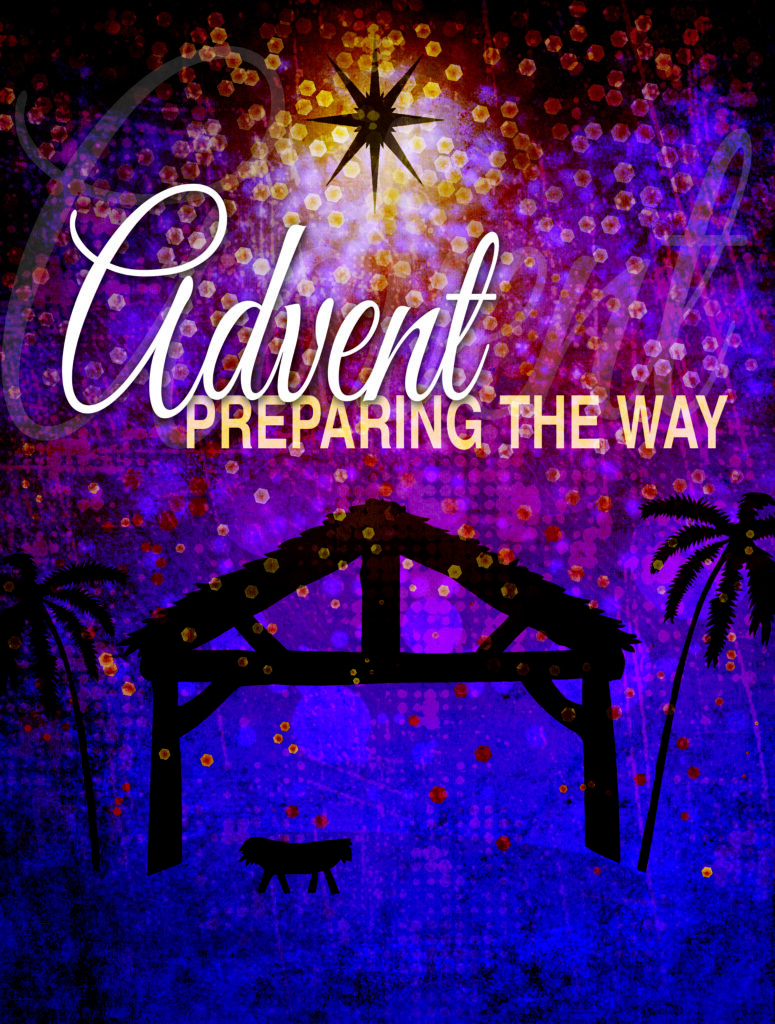
This First Sunday of Advent or the Fourth before Christmas, is the first day of the Liturgical Year. The Mass prepares us this day for the double coming
(advéntus) of mercy and justice. That is why St. Paul tells us, in the Epistle, to cast off sin in order that, being ready for the coming of Christ as our Savior, we may also be ready for His coming as our Judge, of which we learn in the Gospel. Let us prepare ourselves, by pious aspirations and by the reformation of our life, for this twofold coming. Jesus our Lord will reward those who yearn for Him and await him: “Those who trust in Him shall not be confounded.”
This Sunday, the first of the ecclesiastical year, is called, in the chronicles and charts of the middle ages, Ad te levavi Sunday, from the first words of the Introit; or, Aspiciens a longe, from the first words of one of the responsories of Matins.
The Station * is at St. Mary Major’s. It is under the auspices of Mary – in the splendid basilica which possesses the crib of Bethlehem, and is therefore called, in ancient documents, St. Mary’s ad Praesepe – that the Roman Church recommences, each year, the sacred cycle. It would have been impossible to select a place more suitable than this for saluting the approach of the divine birth, which is to gladden heaven and earth, and manifest the sublime portent of a Virgin Mother. Let us go in spirit to this august temple, and unite in the prayers which are there being offered up: they are the very ones we also use, and which we will now explain.
[* The Stations marked in the Roman missal for certain days in the year, were formerly processions, in which the whole clergy and people went to some given church, and there celebrated the Office and Mass. This usage, which dates from the earliest period of the Roman Church, and of which St. Gregory the Great was but the restorer, still exists, at least in a measure; for the Stations are still observed, though with less solemnity and concourse of people, on all the days specified in the missal.]
In the night Office, the Church commences the reading of the Book of Isaias, who, of all the Prophets, has the most distinctly and explicitly foretold the Messias; and she continues this same Book until Christmas day inclusively. Let us strive to enter into the teaching of the holy prophet, and let the eye of our faith affectionately recognize the promised Saviour in the descriptions, sometimes consoling and sometimes terrifying, under which Isaias depicts Him.
The first words of the Church, in the still midnight, are these “Regem venturum Dominum, venite, adoremus” (Come, let us adore the King our Lord, who is to come).
This first duty of adoration complied with, let us listen to the oracle of the prophet Isaias, delivered to us by the holy Church.
Beginning of the Book of the Prophet Isaias. Ch. i. The vision of Isaias, the son of Amos, which ho saw concerning Juda and Jerusalem, in the days of Ozias, Joathan, Achaz, and Ezechias, kings of Juda. Hear, O ye heavens, and give ear, O earth, for the Lord hath spoken: I have brought up children, and exalted them: but they have despised me. The ox knoweth his owner, and the ass his master’s crib: but Israel hath not known me, and my people hath not understood. Woe to the sinful nation, a people laden with iniquity, a wicked seed, ungracious children. They have forsaken the Lord, they have blasphemed the holy One of Israel, they are gone away backwards. For what shall I strike you any more, you that increase transgression? The whole head is sick, and the whole heart is sad. From the sole of the foot unto the top of the head, there is no soundness therein; wounds, and bruises, and swelling sores; they are not bound up, nor dressed, nor fomented with oil.
These words of the holy prophet, or rather of God who speaks to us by the prophet, should make a deep impression on the children of the Church, at this opening of the holy period of Advent. Who could hear without trembling this voice of our Lord, who is despised and unknown even at the very time when He is coming to visit His people? Lest men should be terrified at the splendour of His majesty, He divested Himself of it; and far from acknowledging the divine power of Him who thus humbled Himself out of love to them, these men have refused even to know Him; and the crib where He lay after His birth, had, at first, but two dumb animals to honour or notice it. Do you feel, Christians, how just are the complaints which your God here makes? And how your indifference for all His love is an insult? He calls heaven and earth to witness; He utters anathema against the sinful nation, His ungrateful children. Let us honestly confess that we, too, have not known the value of our Jesus’ visit to us, and that we have but too faithfully imitated the obduracy of the Jews, who heeded not the bright light when it burst upon their darkness. In vain did the angels sing on that December night; in vain did shepherds receive and welcome the invitation to adore the Babe and know Him; in vain did the Magi come from the east, asking where they were to find the crib of the King that was born. At this last example, the city of Jerusalem was somewhat moved; but the astonishment was only for a moment, and the old indifference soon stifled the good tidings.
Thus it is, O Jesus, that Thou comest unto darkness, and darkness does not comprehend Thee. We beseech Thee, let our darkness comprehend the light, and desire it. The day will come when Thou wilt disperse the spiritual and voluntary darkness of men by the awful light of Thy justice. Thy glory, O sovereign Judge, will be magnificent on that day, andwe love to think upon Thy having it: but during these days of our life on earth, deliver us from Thy wrath. We are one great wound from the sole of the foot unto the top of the head; Thou knowest not where to strike: be, then, a Saviour, O Jesus, in this coming, for which we are now preparing. The whole head is sick, and the whole heart is sad: come, and raise up this head which shame and vile passions bow down to the earth. Come, and comfort this heart oppressed with sin and fear. We confess it, our wounds are deep and sore; come, thou good Samaritan, pour in Thy soothing oil and heal them.
The whole world is in expectation of its Redeemer; come, dear Jesus, show Thyself to it by granting it salvation. The Church, Thy bride, is now commencing another year, and her first word is to Thee, a word which she speaks in the anxious solicitude of a mother for the safety of her children; she cries out to Thee, saying: ‘Come!’ No, we will go no farther in our journey through the desert of this life without Thee, O Jesus! Time is passing quickly away from us; our day is perhaps far spent, and the shades of our life’s night are fast coming on; arise, O divine Sun of justice. Come! guide our steps and save us from eternal death.
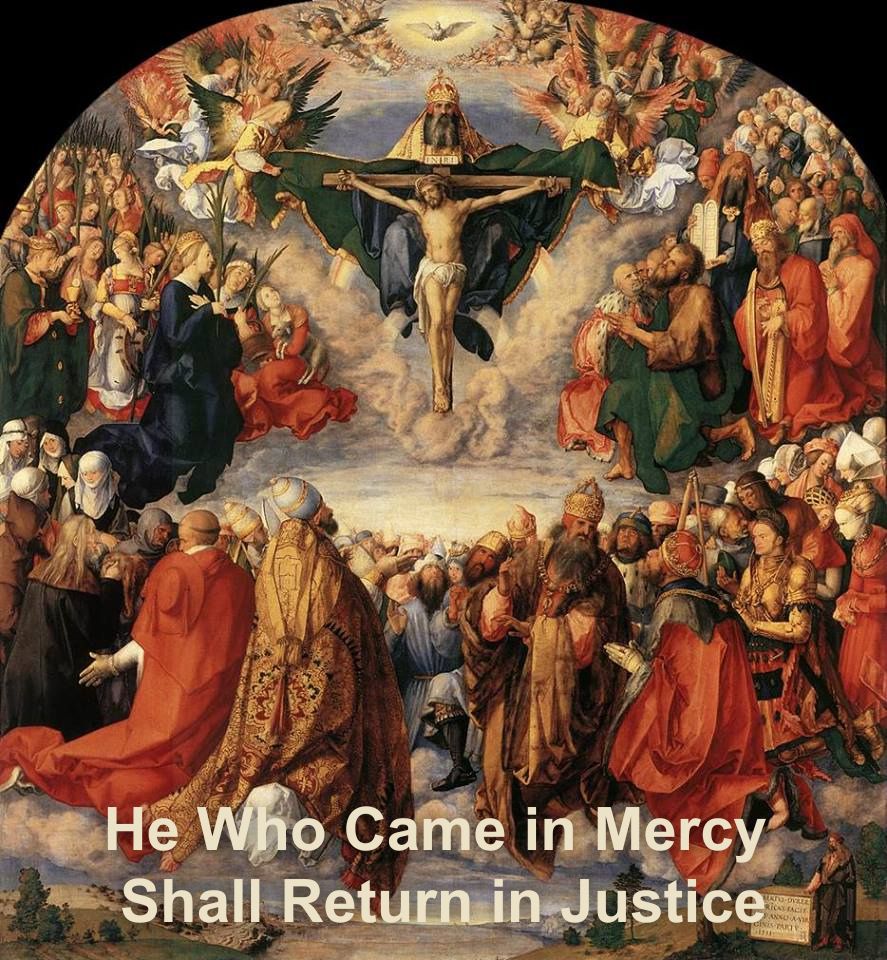
As we have seen this year, the number of the Sundays after Pentecost may exceed twenty-four, and go as far as twenty-eight, according as Easter is each year more or less near to the vernal equinox. But the Mass here given is always reserved for the last; and the intervening ones, be their number what it may, are taken from the Sundays after the Epiphany, which, in that case, were not used at the beginning of the year. This, however, does not apply to the Introit, Gradual, Offertory, and Communion, which are repeated from the twenty-third Sunday. We have seen how that Mass of the twenty-third Sunday was regarded, by our forefathers, as really the last of the cycle. Abbot Rupert has given us the profound meaning of its several parts. According to the teaching we have already pondered over, the reconciliation of Juda was shown us as being, in time, the term intended by God: the last notes of the sacred liturgy blended with the last scene of the world’s history, as seen and known by God. The end proposed by eternal Wisdom in the world’s creation, and mercifully continued, after the fall, by the mystery of Redemption, has now (we speak of the Church’s year and God’s workings) been fully carried out. This end was no other than that of divine union with human nature, making it one in the unity of one only body. Now that the two antagonistic people, Gentile and Jew, are brought together in the one same new Man in Christ Jesus their Head, the two Testaments, which so strongly marked the distinction between the ages of time, the one called the old, the other the new, fade away, and give place to the glory of the eternal Alliance. Hence, it was there that mother Church formerly finished her liturgical year. She was delighted at what she had done during all the past months; that is, at having led her children, not only to have a thorough appreciation of the divine plan, which she had developed before them in her celebrations, but moreover, and more especially, to unite them themselves, by a veritable union, to their Jesus, by a real communion of views, and interests, and loves. On this account, it used to be that she did not revert again to the second coming of the God-Man and the last judgment, two great subjects which she had proposed for her children’s reflections at the commencement of the purgative life, that is, in her season of Advent.
It is only a few centuries ago that, with a view of giving to her year a conclusion more defined and intelligible to the faithful of these comparatively recent times, she chose to conclude the cycle with the prophetic description of the dread coming of her Lord, which is to put an end to time, and to open eternity. From time immemorial, St. Luke had had the office of announcing, in Advent, the approach of the last judgment; the evangelist St. Matthew was selected for this its second, and more detailed, description, on the last Sunday after Pentecost. . . . Several times during Advent we meditate on the circumstances which are to accompany the last coming of Christ our Lord; and in a few days the same great teachings will be again brought before us, filling our souls with a salutary fear. May we, then, be permitted on this last Sunday of our liturgical year to address ourselves in a prayer of desire and praise to our adorable Lord and King, the solemn hour of whose judgment is to be the consummation of His work, and the signal of His triumph.
Commentary from The St. Andrew Daily Missal (1954 ed.) by Dom Gaspar Lefevre, O.S.B., and The Liturgical Year by Dom Prosper Guéranger, O.S.B.
Second class, Green vestments
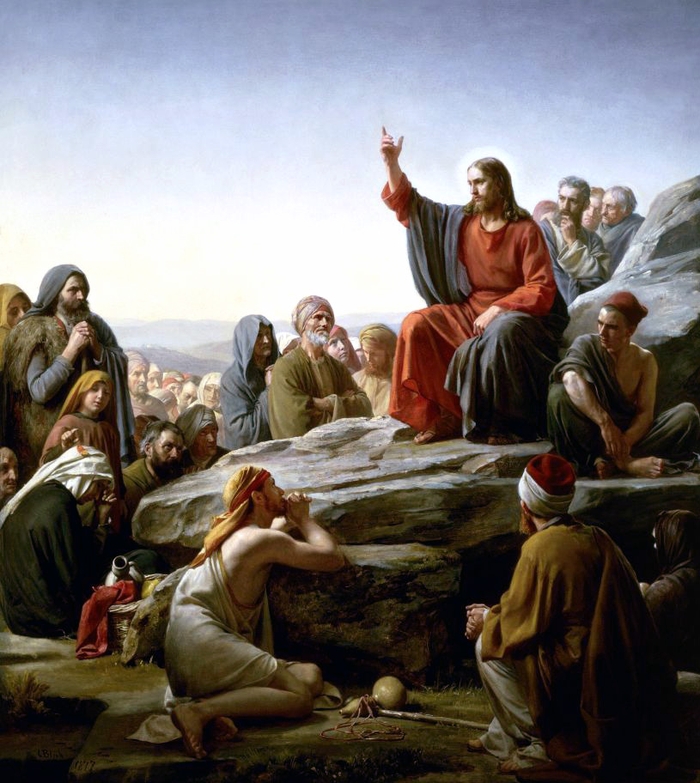
The Gospel brings out again the divinity of Christ. Jesus is God, for He reveals to us “things hidden from the foundation of the world” (Gospel). His word, compared by Him to a small seed cast into the field of the world, and to a little leaven put in the lump, is divine for it stills our passions and produces in our hearts the wonders of faith, hope, and charity of which the Epistle speaks.
The Church, stirred to greater effort by the word of Christ, is admirably represented by these three measures of meal that the energy of fermentation has “wholly leavened” (Gospel) and by the mustard plant, the largest of its kind, where the birds of heaven gladly come for shelter.
The praise which the apostle here gives to the Thessalonians for their fervor in the faith they had embraced, conveys a reproach to the Christians of our own times. These neophytes of Thessalonica, who, a short time before, were worshippers of idols, had become so earnest in the practice of the Christian religion, that even the apostle is filled with admiration. We are the descendants of countless Christian ancestors. We received our regeneration by Baptism at our first coming into the world. We were taught the doctrine of Jesus Christ from our earliest childhood. And yet, our faith is not so strong, or our lives so holy, as were those of the early Christians. Their main occupation was serving the living and true God and waiting for the coming of their Savior. Our hope is precisely the same as that which made their hearts so fervent; how comes it that our faith is not like theirs in its generosity? We love this present life, as though we had not the firm conviction that it is to pass away. As far as depends upon us, we are handing down to future generations a Christianity very different from that which our Savior established, which the apostles preached, and which the pagans of the first ages thought they were bound to purchase at any price or sacrifice.
Commentary from The St. Andrew Daily Missal (1954) by Dom Gaspar Lefebvre O.S.B., (1880-1966) and The Liturgical Year by Dom Prosper Guéranger, O.S.B. (1805-1875).
"Listen carefully, my son, to the master's instructions, and attend to them with the ear of your heart. This is advice from a father who loves you: welcome it, and faithfully put it into practice"
~ St. Benedict of Nursia ~
Copyright © 2015-2025 Saint Joseph Catholic Church, Latin Mass Parish, 602 S 34th St., Tacoma, WA 98418. All Rights Reserved.
Website comments or questions: info@saintjosephtacoma.org


